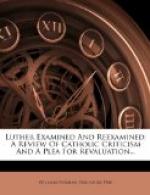“Yes, madam, that is what he is there for.”
“But is it not horrid?”
“Yes, madam, it is perfectly horrid. It is hell.”
“But what are they doing this beastly work for?”
“Madam, they are fighting for a principle that is to keep this country a united republic.”
“Can anything be more horrid?—I mean, not the principle, but this awful butchery.”
“Yes, madam, there is something more horrid than that.”
“What is it?”
“If there would be no one to fight for that principle.”
War is never a pleasant affair. When men are forced to fight for what is dearer to them than life, they will strike hard and deep. It is silly to expect a soldier to walk up to his enemy with a fly brush and shoo him away, or to stop and consider what posterity would probably regard as the least objectionable way for dispatching an enemy. Luther was called to be a warrior; he had to use warriors’ methods. Any general in a bloody campaign can be criticized for violence with as much reason as is shown by some critics of Luther.
5. The Popes in Luther’s Time.
To judge intelligently the activity of Luther it is necessary to understand the state of the Church in his day and the character of the chief bishops of the Church. When reading modern censures of Luther’s attacks upon the papacy, one wonders why nothing is said about the thing that Luther attacked. Catholic critics of Luther surely must know what papal filth lies accumulated in the Commentarii di Marino Sanuto, in Alegretto Alegretti’s Diari Sanesi, in the Relazione di Polo Capello, in the Diario de Sebastiano di Branca de Tilini, in the Successo di la Morte di Papa Alessandro, in Tommaso Inghirami’s Fea, Notizie Intorno Rafaele Sanzio da Urbino, and others. Ranke worked with these authorities when he wrote his History of the Popes. What about the authorities which Gieseler cites in his Ecclesiastical History— Muratori, Fabronius, Machiavelli, Sabellicus, Raynaldus, Eccardus, Burchardus, etc.? A compassionate age has relegated the exact account of the moral state of the papacy in Luther’s days to learned works, and even in these they are given mostly in Latin footnotes. In the language of Augustus Birrell, they are “too coarse.”
Luther’s life (1483-1546) falls into the administration
of nine Popes:
Sixtus IV, 1471-1484; Innocent VIII, 1484-1492; Alexander
VI, 1492-1503;
Pius III, 26 days in 1503; Julius II, 1503-1513; Leo
X, 1513-1521;
Hadrian VI, 1522-1523; Clement VII, 1523-1534; Paul
III, 1534-1549.
Speaking of this series of Popes, the historian Gieseler says: “The succession of Popes which now follows proves the degeneracy of the cardinals (from among whom the Pope is chosen) as to all discipline and sense of shame: they were distinguished for nothing but undisguised meanness and wickedness; they were reprobates.”




